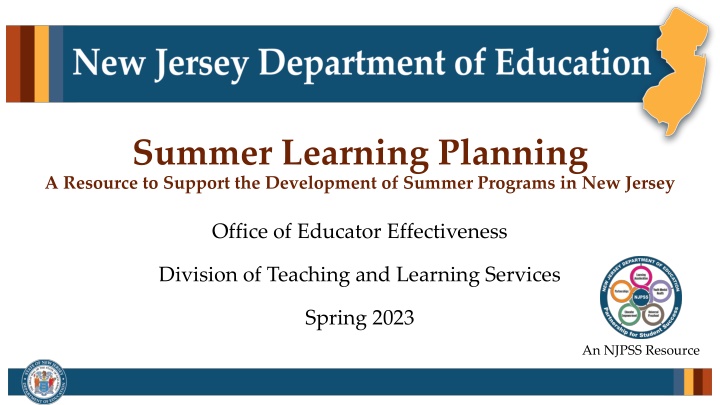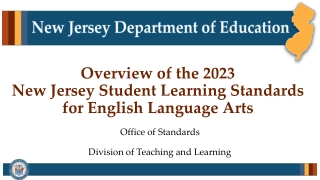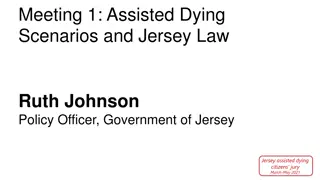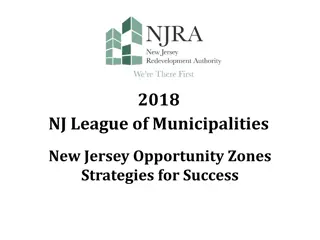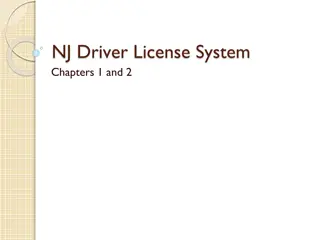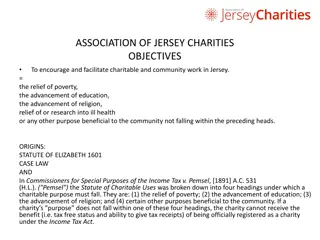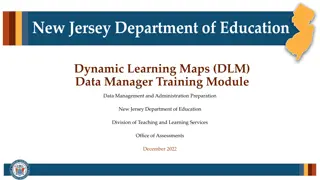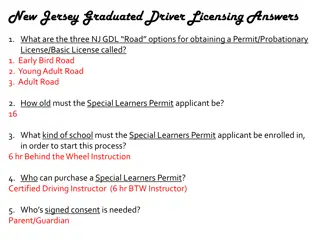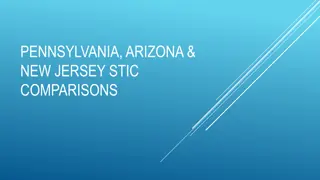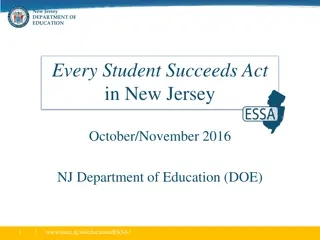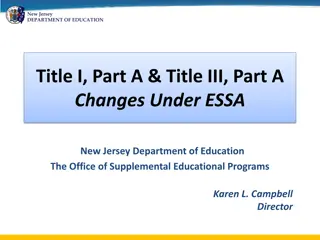Empowering Summer Learning in New Jersey: NJPSS Initiatives
Explore resources and tools by the New Jersey Partnership for Student Success (NJPSS) designed to enhance summer programs, support student development, and empower educators. From learning acceleration to mental health support, discover how NJPSS is shaping the educational landscape in New Jersey through innovative programs and partnerships.
Download Presentation

Please find below an Image/Link to download the presentation.
The content on the website is provided AS IS for your information and personal use only. It may not be sold, licensed, or shared on other websites without obtaining consent from the author.If you encounter any issues during the download, it is possible that the publisher has removed the file from their server.
You are allowed to download the files provided on this website for personal or commercial use, subject to the condition that they are used lawfully. All files are the property of their respective owners.
The content on the website is provided AS IS for your information and personal use only. It may not be sold, licensed, or shared on other websites without obtaining consent from the author.
E N D
Presentation Transcript
Summer Learning Planning A Resource to Support the Development of Summer Programs in New Jersey Office of Educator Effectiveness Division of Teaching and Learning Services Spring 2023 An NJPSS Resource
Norms Students should be at the center of our work Be present Do not hesitate to ask a question as they arise 2
New Jersey Partnership for Student Success (NJPSS) A system of supports and programs for students and educators to be used at the local level to meet the specific needs of each district The supports and programs are designed to be tailored and molded to provide the necessary supports to assist students and educators as they move forward 3
NJPSS: The Five Areas of Focus Learning Acceleration: A collection of resources, guidance, and tools designed to move students forward through increased instructional time and accelerated learning opportunities. Youth Mental Health: Support designed with social and emotional learning at the forefront helping students lead a balanced and healthy life, through their educational years and beyond. Universal Preschool: Enhanced support for existing programs and increased funding opportunities to expand the program into new districts, with support and partnership from New Jersey s licensed childcare and Head Start providers, and to increase the number of available seats in existing programs. Educator Empowerment: Targeted and enhanced professional development opportunities focused on techniques to accelerate learning, mental health and well-being supports for school staff, and the recruitment and retention of diverse and highly-qualified educators with the understanding that these endeavors are necessary to grow the educational ecosystem and provide the best environment for students. Partnerships: The New Jersey Department of Education looks forward to expanding partnerships to positively impact outcomes through the reach of partnerships. 4
Maximizing Schedules to Summer Learning Planning These resources falls under the Learning Acceleration area of focus. Summer Learning Planning resources provide information on implementing a summer program designed to curb the summer slide, while increasing opportunities to support academic recovery. 5
Agenda Advancing the Traditional Summer Program The Stages of Summer Learning Planning Summer Learning Program Development Resource and Workbook 6
Advancing the Traditional Summer Program Summers are for learners, and the development of robust summer learning programs that continuously engage and excite students while preparing them for the upcoming school year is instrumental in curbing the summer slide. 7
The Summer Slide There are students who may begin the school year performing at a lower academic level than which they did at the close of the previous year. This gap is known as the summer slide. This occurs due to students having scarce opportunities for learning over the summer break. Our youngest learners, those in kindergarten through second grade, and low- income students are the most vulnerable to the negative impact of summer break. Students lose the most skills in reading and math, which often causes many educators to prioritize reteaching instead of introducing new content in the earlier months of the school year. 8
Traditional vs. Enhanced Summer School The traditional approach is one in which remediation, credit recovery and remedial interventions are often prioritized. The adoption of these following characteristics can aid in the advancement of summer programs which accelerate learning and increase equity in educational opportunities. 9
The Stages of Summer Learning Planning To provide students with out of school learning opportunities that will accelerate their learning, program planning should begin in September and continues throughout the year. 10
The NSLA Quality Improvement Cycle Comprised of four stages each with a distinct purpose These stages contain distinct activities which occur over the course of a calendar year 11
The Planning and Training Stages Planning Training Summer program teams prepare the summer instructional and support staff for summer learning Where the groundwork for summer programs is developed Divided into twelve distinct workstreams The purpose is to ensure consistency in the delivery of content Activities begin in September, continuing through July Activities begin in October and conclude in May/June 12
The Assessing and Reflection Stages Assessing Reflection Teams analyze the data collected during the assessing stage and apply its findings to make improvements to the program in preparation for the following year The summer program team will be guided through the process of completing a program evaluation and administering stakeholder feedback surveys to track their impact and progress Activities take place in August and September connecting their work back to the Planning Stage Activities begin in March and continues through August 13
Summer Learning Program Development Resource Envisioned to be read alongside the Department s 2022 Summer Learning Guide Utilizes the National Summer Learning Association s (NSLA) Quality Improvement Cycle as a frame for summer planning Includes sample summer schedules, as well as a plethora of resources to assist in summer program planning 15
Summer Learning Program Development Workbook To complement the planning resource, the Department has developed a Summer Learning Program Development Workbook This resource is designed to help organize team meetings and monitor progress of summer learning planning Based on the research of the Wallace Foundation and the NSLA and is designed to meet the needs of New Jersey s schools 16
The Four Stages: A Year Long Planning View The workbook organizes tasks and activities into the NSLA four-stage quality improvement cycle It provides a twelve-month overview of summer program development Areas in gray display the months in which those tasks would occur The first twelve tasks fall under the planning stage 17
Utilizing the Workbook The workbook includes key tasks under each category, as well as everything necessary for planning including: Recommended timelines Status updates A distinction between necessary and extended tasks (based upon research) This interactive tool was designed to acknowledge the uniqueness of each school community 18
Multiple Uses for Multiple Needs The workbook was developed to provide districts with the flexibility to use it in whatever ways suits their needs locally. Districts with well-developed programs may find this to be most useful during the assessing and reflection phases, which occur largely in the spring and summer. Districts wishing to rethink current programs or develop more robust ones, may find this workbook useful in guiding them during all phases of program development. 19
Thank You! New Jersey Department of Education: nj.gov/education Office of Educator Effectiveness: edueval@doe.nj.gov Follow Us! Facebook: @njdeptofed Twitter: Instagram: @NewJerseyDoe @NewJerseyDOE 20
